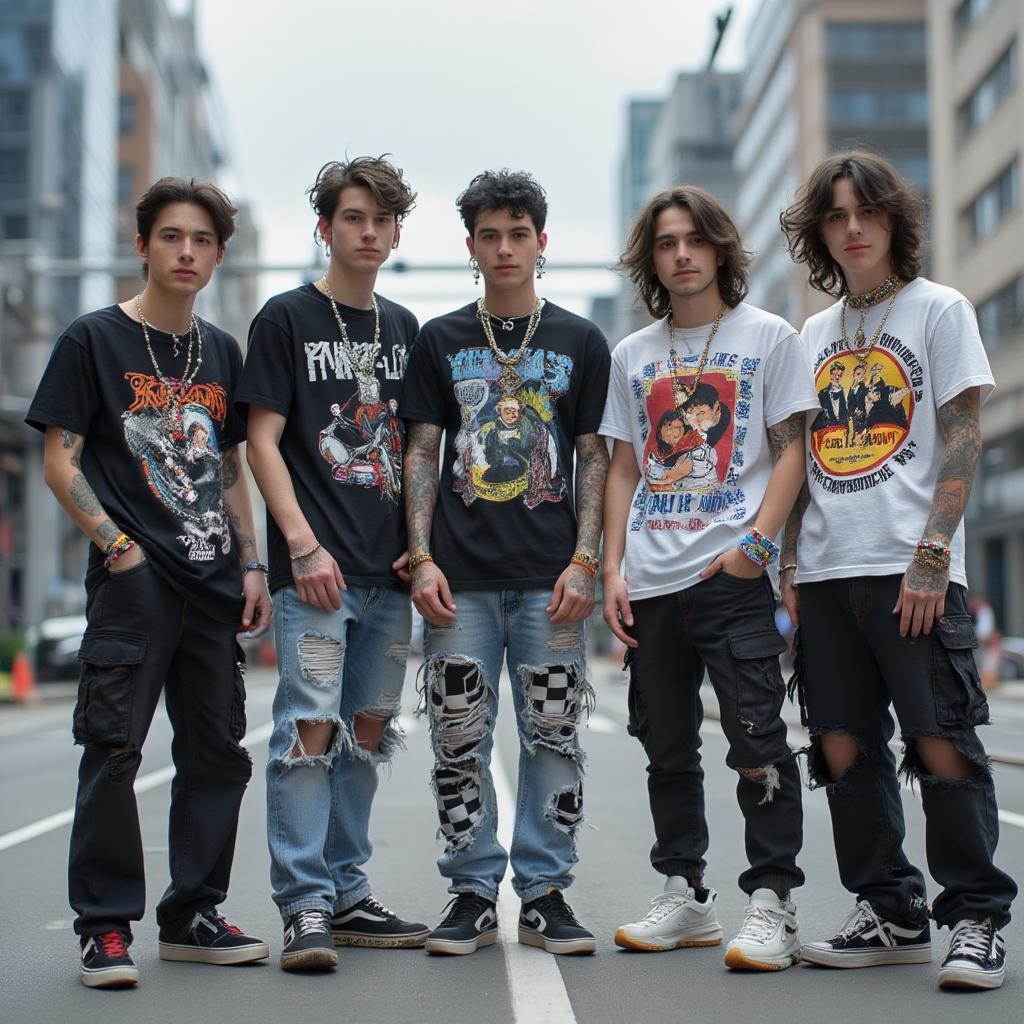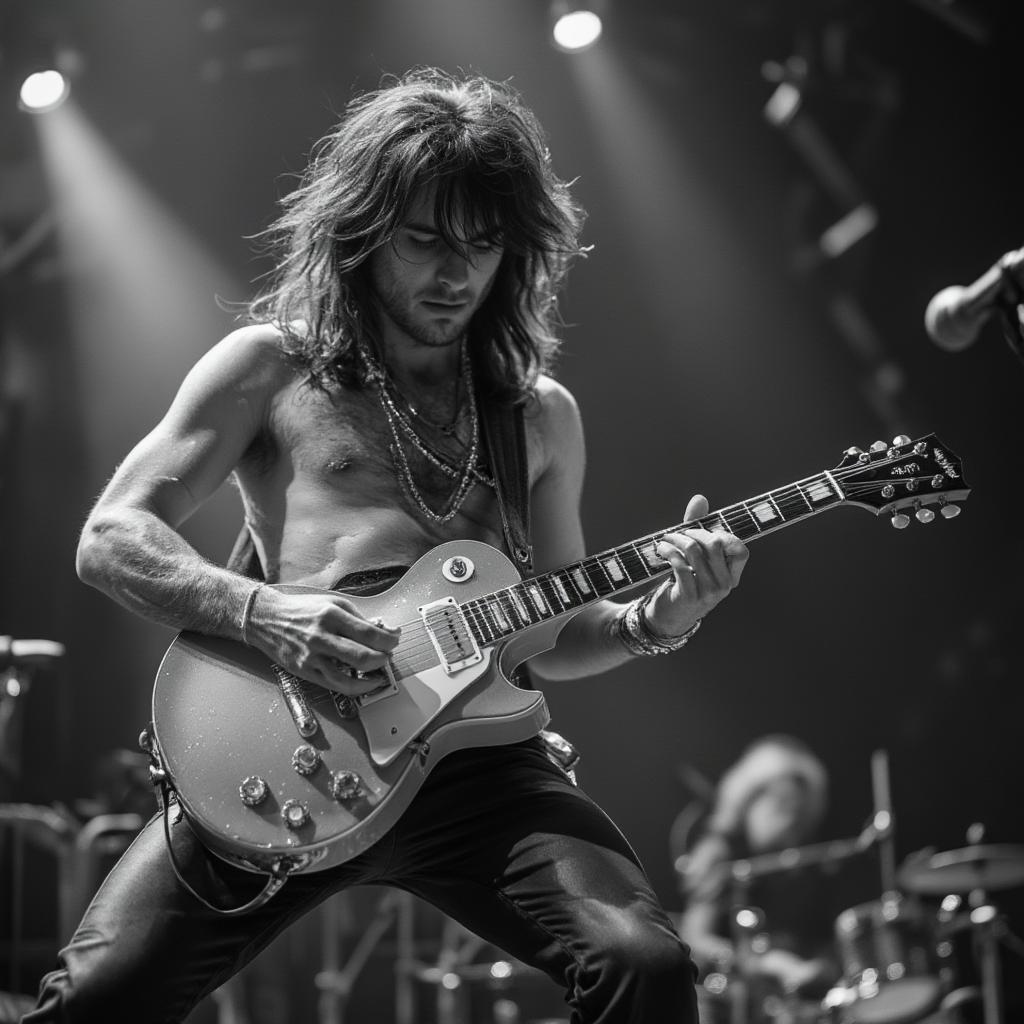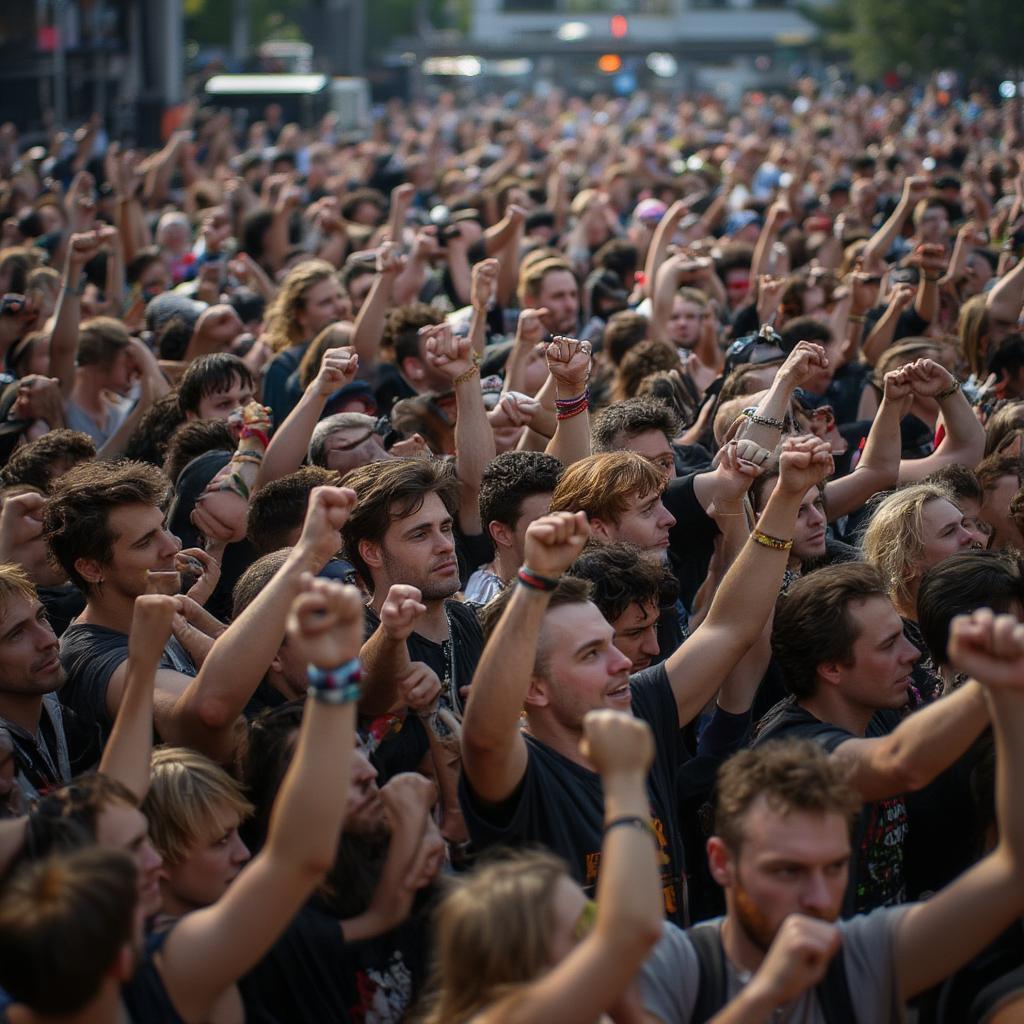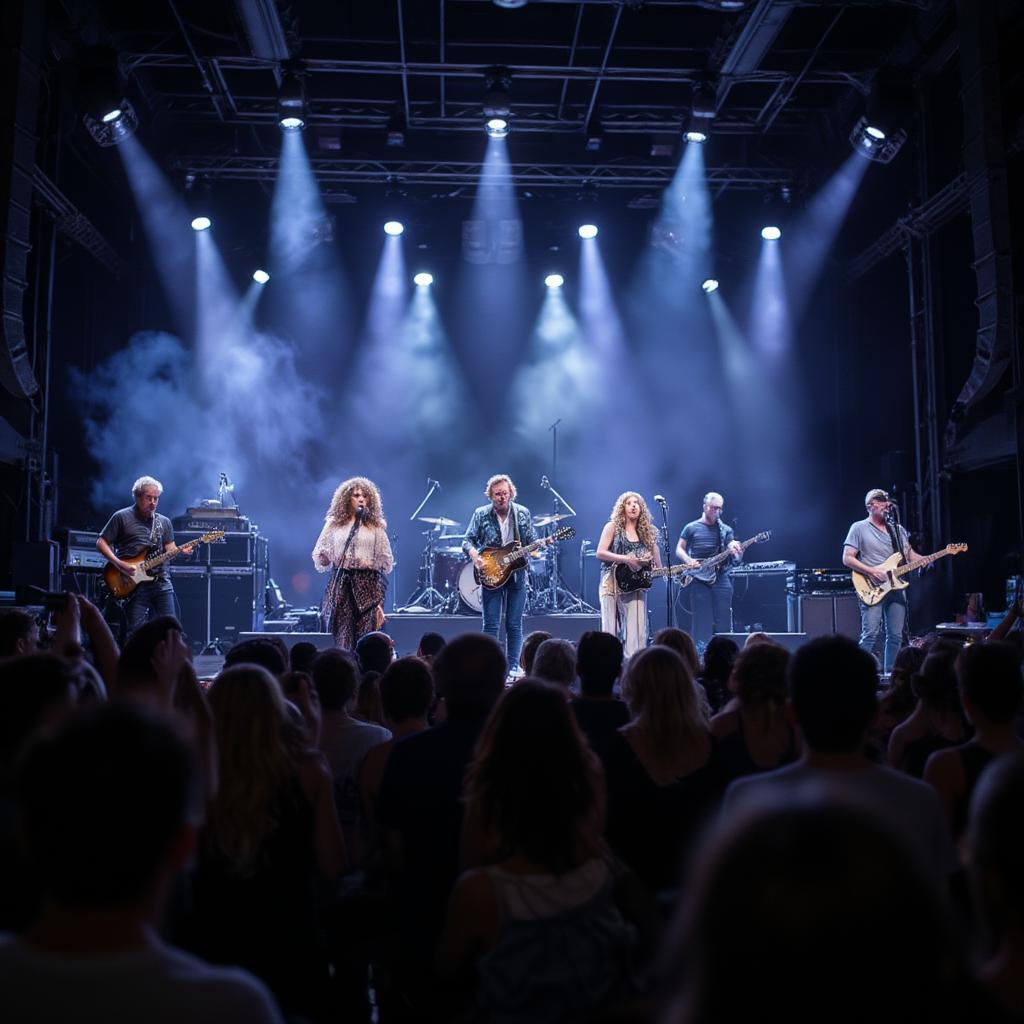The Raw Energy of Punk Rock Bands: A Deep Dive into the Genre
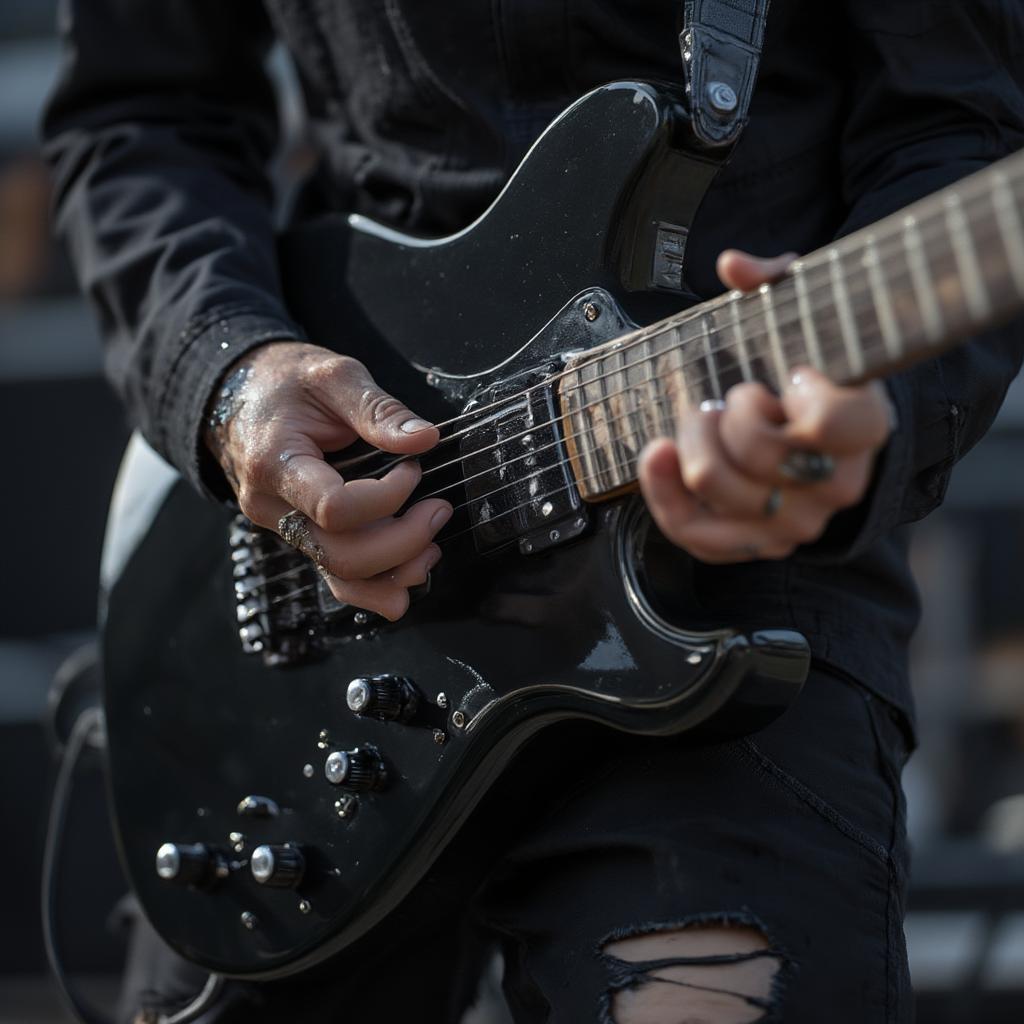
Punk Rock Bands, a force of rebellious energy and raw emotion, have shaped the landscape of music for decades. From their DIY ethos to their unapologetic lyrics, these bands have challenged the status quo and inspired countless artists. As the lead guitarist and principal songwriter for Shock Naue, a band steeped in the spirit of rock, I’ve always been captivated by the impact and influence of punk. We’ve drawn inspiration from its untamed energy while forging our own unique path.
What Exactly Defines Punk Rock Bands?
Punk rock isn’t just a genre; it’s an attitude. It’s a reaction against the perceived excesses of mainstream rock and a return to simplicity and directness. But what are the key characteristics?
- Fast, Raw, and Loud: Punk music is known for its fast tempos, distorted guitars, and aggressive vocals. It’s meant to be visceral and in your face. Think of it like the musical equivalent of a punch in the gut – in a good way, of course.
- DIY Ethos: A core tenet of punk is its DIY approach. Bands often self-produce their music, book their own shows, and create their own merchandise. This independence is a powerful statement against the corporate control of the music industry.
- Simple Song Structures: Forget complex arrangements and extended solos. Punk songs are typically short and to the point, often using basic chord progressions and repetitive structures. This simplicity allows for greater energy and impact.
- Socially Conscious Lyrics: Many punk bands tackle social and political issues in their lyrics, expressing frustration with the system and calling for change. These bands aren’t afraid to speak their minds.
- Rebellious Spirit: At its heart, punk is about rebellion. It’s about questioning authority, challenging norms, and expressing individuality. It’s a voice for the outsiders and the underdogs.
Key Eras and Subgenres of Punk Rock
The punk rock scene has evolved over time, giving rise to various subgenres. Understanding these nuances is key to appreciating the breadth of the genre.
The First Wave (1970s): The Birth of Punk
The 1970s marked the emergence of punk, with bands like The Ramones, Sex Pistols, and The Clash leading the charge. This era was characterized by raw, unpolished sound and anti-establishment sentiment. These bands gave voice to a generation feeling disaffected and disenfranchised. This was a seismic shift in music, a revolution against the prevailing trends.
Hardcore Punk (1980s): Speed and Intensity
Hardcore punk took the intensity of the first wave to a new level, with faster tempos, more aggressive vocals, and politically charged lyrics. Bands like Black Flag, Minor Threat, and Dead Kennedys epitomized this era. “The speed and aggression of hardcore spoke to the frustrations of the time,” explains Dr. Elara Vance, a music historian and punk enthusiast. “It was music as a form of social protest.”
Pop Punk (1990s-2000s): Accessibility and Melody
Pop punk brought a more melodic approach to the genre, with catchy hooks and relatable lyrics. Bands like Blink-182, Green Day, and Sum 41 made punk accessible to a wider audience, often incorporating themes of teenage angst and relationships. This subgenre showed that punk could be catchy and commercially viable, without losing its core rebellious spirit. For those interested in bands pushing the boundaries of sound within the rock sphere, you can learn more about alternative bands.
Other Notable Subgenres
Punk rock has diversified into numerous subgenres:
- Street Punk: A more working-class, aggressive subgenre.
- Anarcho-Punk: Politically driven with anarchist ideals.
- Post-Punk: More experimental and art-influenced.
- Ska Punk: Blends punk with ska rhythms.
How Have Punk Rock Bands Influenced Music?
The impact of punk rock bands extends far beyond the genre itself. Their DIY ethic and independent spirit have influenced countless musicians, and their approach to song writing has been copied across genres.
Inspiring DIY Culture
Punk’s DIY ethic has empowered many musicians to take control of their careers, from recording their music to booking their tours. This has led to the growth of independent music scenes all over the world. It’s about creating art on your own terms.
Shaping Alternative and Indie Music
Punk has been a direct influence on the development of alternative and indie rock. Bands like Sonic Youth, Nirvana, and Pixies owe a considerable debt to the rebellious spirit and sonic experimentation of early punk. The legacy of punk is evident in the ethos of indie rock artists.
Providing a Voice for the Underrepresented
Punk has given a voice to the marginalized and underrepresented. Its emphasis on social commentary and political activism has inspired countless individuals to speak out against injustice. “Punk created a space for those who didn’t fit in,” comments Professor Liam Chen, a sociologist specializing in youth culture. “It was a powerful force for social change.”
What are the Key Elements of a Great Punk Rock Song?
So, what makes a great punk song? While the genre is diverse, certain elements often stand out.
- Catchy Hooks: Despite their raw sound, punk songs often feature memorable hooks. Think of the chorus of “Blitzkrieg Bop” by the Ramones. These hooks make the songs instantly recognizable.
- Aggressive Riffs: The guitar riffs in punk are often simple but powerful, conveying raw energy. These riffs often drive the tempo and the emotional tone of the song.
- Direct Lyrics: Punk lyrics are often direct and to the point. No flowery language or complex metaphors, just raw emotion and social commentary.
- Short and Fast: Punk songs are typically short and fast. This brevity keeps the energy high and avoids getting bogged down in lengthy instrumental passages.
- Unapologetic Vocals: Punk vocals are often raw, aggressive, and full of passion. It’s about expressing emotion unfiltered.

Where Can You Discover New Punk Rock Bands Today?
The spirit of punk remains alive and well. Here are a few places to find new bands:
- Local Music Scenes: Look for shows at local venues, DIY spaces, and house shows. These places often host up-and-coming punk bands.
- Online Platforms: Bandcamp, Soundcloud, and YouTube are great resources for discovering new music.
- Independent Labels: Seek out independent record labels that specialize in punk music.
- Music Blogs and Podcasts: Many online publications focus on covering the punk scene.
- Social Media: Follow hashtags like #punkrock, #hardcorepunk, and #diymusic to discover new bands.
If you appreciate the raw energy of punk, explore the styles of bands that lean into the more glamorous side of the music scene, check out some glam rock bands.
How Can You Support Punk Rock Bands?
Supporting punk bands is about more than just buying their music. It’s about engaging with their community.
- Buy their music directly: Support independent bands by buying their music through platforms like Bandcamp. This ensures they receive more of the profits.
- Attend their shows: Live shows are a key part of the punk experience. Going to shows allows you to connect with the band and the community.
- Buy their merch: T-shirts, patches, and other merchandise help bands finance their projects.
- Spread the word: Tell your friends about the bands you love and share their music on social media.
- Engage with the community: Support your local scenes and create your own DIY projects to contribute to the punk ethos.
Conclusion: The Enduring Power of Punk
Punk rock bands are more than just musicians; they are cultural revolutionaries. Their raw energy, DIY ethic, and unapologetic lyrics have inspired countless individuals to express themselves and challenge the status quo. They’ve shaped the landscape of music, influencing countless artists and empowering generations with their message of rebellion and independence. The spirit of punk rock continues to thrive today, proving that its powerful voice will not be silenced and, in fact, rock as a whole continues to be an influential force. The impact of punk rock bands on the music scene and its rebellious attitude remains as vital as ever.
FAQ About Punk Rock Bands
1. What are the main characteristics of punk rock music?
Punk rock is characterized by fast tempos, distorted guitars, simple song structures, socially conscious lyrics, and a rebellious attitude. It’s known for its raw, unpolished sound and DIY ethos.
2. Who are some of the most influential early punk rock bands?
Some of the most influential early punk rock bands include The Ramones, Sex Pistols, and The Clash. These bands helped to define the genre and established its core principles.
3. How did punk rock influence the DIY music scene?
Punk rock’s DIY ethic empowered musicians to take control of their careers, from producing their music to booking their own shows, leading to a thriving independent music scene worldwide.
4. What is hardcore punk?
Hardcore punk is a subgenre that took the intensity of the first wave to a new level, featuring faster tempos, more aggressive vocals, and politically charged lyrics. Black Flag is a key example of this subgenre.
5. What is pop punk?
Pop punk is a subgenre that combines the energy of punk rock with catchy melodies and relatable lyrics, making it more accessible to a wider audience. Green Day and Blink-182 are prime examples.
6. How do punk rock bands typically support themselves?
Punk rock bands often support themselves by selling their music and merchandise directly to fans, performing at live shows, and embracing the DIY ethic by handling their own promotion and booking.
7. Why is punk rock still relevant today?
Punk rock remains relevant because its messages of rebellion, social commentary, and individual expression still resonate with people today. It continues to provide a voice for the marginalized and empower those who feel like outsiders. You can also appreciate its legacy with bands like the donnas who continue to spread the message.
8. How can I start exploring punk rock music?
You can start by exploring classic bands like The Ramones, Sex Pistols, and The Clash, then dive into various subgenres and utilize online platforms like Bandcamp, Soundcloud, and YouTube to discover new and emerging bands.
9. What is the role of political activism in punk rock?
Political activism is a core part of punk rock, with many bands using their music to express social commentary, critique societal issues, and advocate for change. This is a vital element of the genre’s identity.

